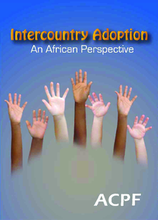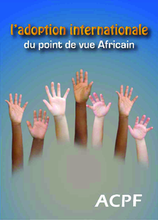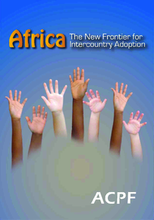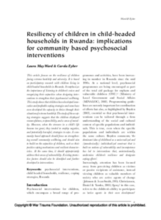Displaying 521 - 530 of 665
This publication was prepared as a background document to inform the discussions and debates during the Fifth International Policy Conference on the African Child held on 29-30 May 2012 in Addis Ababa, Ethiopia. This report examines the rationale behind increasing intercountry adoption in Africa, the main thrust of international standards, the extent and magnitude of African intercountry adoption and its problems and challenges. The paper provides recommendations to this increasing trend and aims to establish a more Pan-African position on the topic of intercountry adoption.
This publication, published in French, was prepared as a background document to inform the discussions and debates during the Fifth International Policy Conference on the African Child held on 29-30 May 2012 in Addis Ababa, Ethiopia. This report examines the rationale behind increasing intercountry adoption in Africa, the main thrust of international standards, the extent and magnitude of African intercountry adoption and its problems and challenges. The paper provides recommendations to this increasing trend and aims to establish a more Pan-African position on the topic of intercountry adoption.
In this report, Retrak examines the situation of girls living on the streets in Kampala, Uganda and Addis Ababa, Ethiopia, and provides key recommendations on the development programs required to address their needs. The report urges for scaling up services, building new facilities for street girls, and building staff capacity to handle issues related to this population.
This publication was prepared as a background document to inform the discussions and debates during the Fifth International Policy Conference on the African Child held on 29-30 May 2012 in Addis Ababa, Ethiopia. This report provides a situational analysis of the law and practice of intercountry adoption in Africa, with the aim of informing debate on conceptualizing, developing and implementing policies, laws, and programs and research in relation to intercountry adoption in Africa.
This paper investigates the time–space practices of young people caring for their siblings in youthheaded households affected by AIDS in Tanzania and Uganda. Based on qualitative exploratory research with young people heading households, their siblings, NGO workers and community members, the article develops the notion of sibling ‘caringscapes’ to analyse young people’s everyday practices and caring pathways through time and space.
This paper combines qualitative research with three micro data sets and finds that the presence of urban basic services is importantly linked to child residence of migrant parents.
Research was conducted in five Rift Valley towns in Kenya in 2011 to understand the link between emergencies and the perceived increase of children joining the streets. Findings show that emergencies such as Post Election Violence and drought have caused children to join the streets. By far the biggest reason for children joining the streets was food insecurity. The authors advocate for an urgent, large-scale response to place children currently connected to the streets in durable situations in tandem with a multi-sectorial development approach to tackle and address the root of the crisis.
This mapping and assessment report of Malawi’s Child Protection System offers key recommendations to strengthen the child protection system, including enforcing legislation, coordinating mechanisms, building capacity of the social service workforce, harmonization of child protection services, and strengthening accountability mechanisms.
Based on participatory research with children living in child headed households in Rwanda, this article focuses on the resilience of children facing extreme hardship and adversity. While the research focuses on child headed households, this study’s findings can be considered more broadly for interventions for other vulnerable children to support their development of innovative coping strategies.
This discussion paper puts forward a set of lessons learned and recommendations for referral mechanisms and case management for vulnerable children in the Eastern and Southern Africa region (ESAR).








